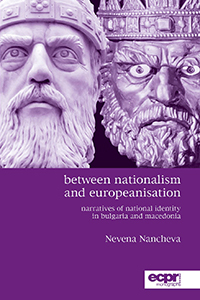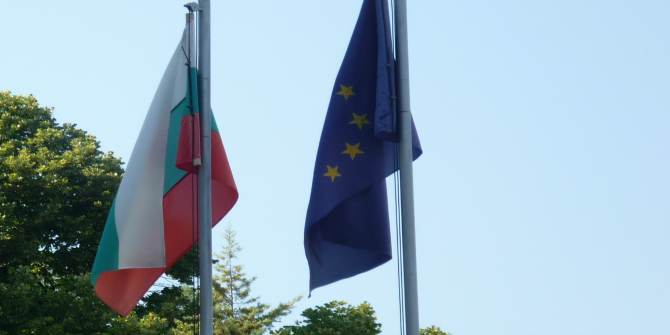In Between Nationalism and Europeanisation: Narratives of National Identity in Bulgaria and Macedonia, Nevena Nancheva looks at two post-communist Balkan states ‒ Bulgaria and Macedonia ‒ to explore how their narratives of national identity have changed in the context of Europeanisation and EU membership preparations. Although a challenging read at times, this book focuses on two underrepresented states to offer reflections on the influence of EU membership as a counter to rising Euro-scepticism, writes Simeon Mitropolitski.
Between Nationalism and Europeanisation: Narratives of National Identity in Bulgaria and Macedonia. Nevena Nancheva. ECPR Press. 2015.
 In her book Between Nationalism and Europeanisation: Narratives of National Identity in Bulgaria and Macedonia, Nevena Nancheva discusses European integration through its impact on national identity in two post-communist countries – Bulgaria and Macedonia. Her goal is to assess any modifications in demarcating the boundaries of national political community and what their effects are on the perceived legitimacy of both national politics and European integration (1). Nancheva is willing to demonstrate that beyond the specific geographic and historic context, there is nothing unusual in the way that national identities in these two countries have been constructed and maintained. Therefore, this particular research goes beyond the specific context to speak to a broader spectrum of European cases.
In her book Between Nationalism and Europeanisation: Narratives of National Identity in Bulgaria and Macedonia, Nevena Nancheva discusses European integration through its impact on national identity in two post-communist countries – Bulgaria and Macedonia. Her goal is to assess any modifications in demarcating the boundaries of national political community and what their effects are on the perceived legitimacy of both national politics and European integration (1). Nancheva is willing to demonstrate that beyond the specific geographic and historic context, there is nothing unusual in the way that national identities in these two countries have been constructed and maintained. Therefore, this particular research goes beyond the specific context to speak to a broader spectrum of European cases.
Between Nationalism and Europeanisation is located at the crossroads of European studies, area studies, cultural-political geography and nationalism studies (185). Methodologically, it applies discourse and content analysis in combination with historical and foreign policy analysis to trace the mechanisms of narrating and re-narrating national identity within a changing discursive environment (11). The choice of cases – Bulgaria and Macedonia – derives from the fact that nationalisms in both countries were discursively in conflict for the best part of the 1990s, precisely before they joined the post-communism ‘road to / return to Europe’ march. The author limits the scope of the research to public rhetoric deployed by state actors. These actors are more than simple political entrepreneurs, transmitting signals representing political interests between national communities and EU institutions. Rather, they reconstruct discourses on national identity that may better fit with Europeanisation. In other words, they change the meaning of what it is to be Bulgarian and Macedonian.
The structure of the book chronologically reflects the impact of the process of Europeanisation on the narratives of national identity in Bulgaria and Macedonia. The first three chapters present the central research question, the main theoretical approaches within the academic literature and different methodological choices. Chapters Four through Six concern the narratives of national identities before, during and after the impact of Europeanisation in each country. Chronologically, the author tells the story of Bulgarian and Macedonian nationalisms, their origin and discursive development from mutually exclusive phenomena towards gradual reconciliation through the process of Europeanisation. The final chapter wraps up the main conclusions, briefly summarises the book’s research contribution and sketches possible paths ahead.
 Image Credit: Flags of Bulgaria and European Union (Brejnev CC0)
Image Credit: Flags of Bulgaria and European Union (Brejnev CC0)
Among the findings, it is worth singling out Chapter Five, which roughly accounts for half of the entire book. Here, Nancheva presents and discusses evidence that suggests how national identities may change so that past and present nationalist conflicts become the ground for inter-state reconciliation consistent with the process of Europeanisation. Thus, good relations with neighbours become signs of progress; civic statehood gradually replaces ethnic nationalism; politics become extricated from bloody history; and ethnic minorities become detached from territory as a unique signifier.
To assess the heuristic place of this research within longstanding debates between big and bounded generalisations of the post-communist world, this book clearly sides with the former. This school looks at post-communist countries as yet another illustration of universal trends. Within European studies, this study is clearly positioned besides the Euro-optimist school of thought, among scholars who see the EU as promoting democracy, liberalism and human rights. As far as the methodology is concerned, the book represents the minority position of discourse and qualitative methods as opposed to a positivist paradigm. In relation to area studies, Nancheva chooses two countries from the Balkans, a region unnecessarily underrepresented in the academic literature unless the focus is put on ethnic tensions and civil wars. As far as the ontological opposition of elites-society is concerned, the author clearly prefers to focus on the elite articulation of narratives of national identity.
The explanatory model takes the change in national identity and the enhanced legitimacy of EU as the result of transformations in elite narratives that take into account, among others, the formal progress of European integration (180). The better the prospects of joining the EU, the larger is the space for elites to manoeuvre to reshape national identity in a pro-EU direction. This model works well in explaining the different levels of progress of Europeanisation in Bulgaria, which is already an EU member, and in Macedonia, which for many years has been in the waiting room. This model presents national identity as a key element. An alternative model could be suggested, however, in which the change in behaviour becomes the simple outcome of external material incentives, among which is the key promise of EU membership.
Despite its intriguing title and captivating subject matter, Between Nationalism and Europeanisation does not target the general public. Highly specific technical language makes it a difficult read for graduate students and even for faculty members. Without wanting to be critical at any cost, I also found the emphasis on formal demonstration within an apparently discursive study too heavy. I would have appreciated instead having more raw material for discussion. While I understand that social science needs generalisations and that narratives do not speak for themselves, I really felt hungry for more discursive examples, especially for those suggesting shifts in national identities. This subjective critique notwithstanding, the book is an interesting read for those who, in these times of rising Euro-scepticism, still look for evidence and arguments for the benign influence, direct or indirect, of EU membership.
Simeon Mitropolitski, PhD, teaches courses in political science and methodology at the University of Ottawa. He is author of over thirty peer-reviewed articles and book reviews. His research interests include post-communist political development, EU integration, political culture, methodology and the state of contemporary political science. Read more reviews by Simeon Mitropolitski.
Note: This review gives the views of the author, and not the position of the LSE Review of Books blog, or of the London School of Economics.







